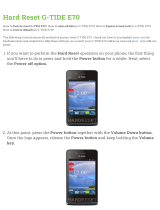QE-E70 User’s Manual
Index
Chapter 1 <Introduction> ........................................................ 5
1.1 <Product Overview> ..................................................... 5
1.2 <Product Specification> ................................................ 6
1.3 <Mechanical Drawing> ................................................. 8
1.4 <Block Diagram> .......................................................... 9
Chapter 2 <Hardware Setup> ................................................ 10
2.1 <Connector Location>................................................. 10
2.2 <Interface Reference> ................................................ 11
2.2.1 <Internal interface>........................................... 11
2.3 < Connector Pin Assignments>................................... 12
2.3.1 <PCI Express Interface Signals> ...................... 15
2.3.2<Serial ATA Interface Signals>........................... 16
2.3.3<Serial ATA Interface Signals>........................... 17
2.3.4<SDIO Interface Signals> .................................. 17
2.3.5<High Definition Audio Signals/AC'97> .............. 18
2.3.6<LVDS Flat Panel Signals>................................ 18
2.3.7<DisplayPort Interface Signals>......................... 19
2.3.8<LPC Interface Signals> .................................... 19
2.3.9<SPI Interface Signals> ..................................... 20
2.3.10<Input Power Pins> ......................................... 20
2.3.11<Power Control Signals> ................................. 20
2.3.12<Power Management Signals>........................ 21
2.3.13<Miscellaneous Signals> ................................. 22
2.3.14<Thermal Management Signals>..................... 22
2.4 < VGA Interface > ....................................................... 23
Chapter 3 <System Setup>.................................................... 24
3.1 <Audio Configuration> ................................................ 24
3.2 <Display Properties Setting> ...................................... 25
3.3 <SATA configuration>.................................................. 27
3.4 <USB3.0 configuration>.............................................. 27
3.4.1 < USB 3.0 Driver install >.................................. 27
Chapter 4 <BIOS Setup>........................................................ 30
Appendix A <Flash BIOS> ..................................................... 31
A.1 <Flash Tool> ............................................................... 31
A.2 <Flash BIOS Procedure> ........................................... 31
Appendix B <Programming GPIO’s> .................................... 33
Appendix C <Programming Watchdog Timer >................... 34
Contact information ............................................................... 35




















